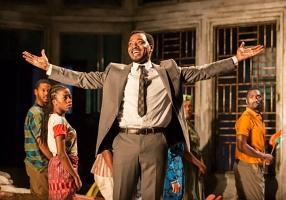A Season in the Congo
The Democratic Republic of Congo is a huge country in the middle of Africa. The second largest country in the continent, it possesses highly fertile soils and equally rich mineral resources. Given those facts, its no surprise that the country attracted the attention of colonial powers - notably Belgium - in the late nineteenth century through to the middle of the twentieth century. And it is the end of that era that this play focuses on.
Written by poet, author and politician Aimé Césaire (1913-2008) and translated by Ralph Manheim, 'A Season In The Congo' centres on Patrice Lumumba (powerfully played here by Chiwetel Ejiofor) who became Prime Minister of the Congo when it gained independence from Belgium in 1960. Subsequently, Lumumba was removed from power and shot by firing squad in 1961. His demise was brought about by the Congo Crisis during which the mineral rich province of Katanga succeeded from the Congo, declaring itself an independent state.
The story here is complex largely because of the involvement of countries such as the Soviet Union and the USA. And the United Nations also play a part in providing a peace-keeping force which seems at times totally impotent (only able to resort merely to sending 'strong notes' in attempting to resolve the crisis) and at other times hampering the workings of the elected government of the Congo. Joe Wright's production does make the content understandable and digestible, and this is largely achieved through the use of puppetry and grotesquely imagery. For example, businessmen and bankers in Belgium are portrayed as puppets with huge heads, and when representatives of America and the Soviet Union make statements, they are accompanied by skulls which mimic their counterparts' speech. Belgian paratroopers are characterised by hoards of miniature toy soldiers which descend from the ceiling, and the European and American characters are denoted by actors wearing rather elongated pink noses - suggesting, I assume, that these are people poking their nostrils into matters over which they should have no concern or control. Though the puppetry, and indeed the entire production, is inventive and effective in many ways, I couldn't help wondering if it trivialised the subject at least to some extent. Certainly the first half felt rather insubstantial, even if the second half more than made up for it by romping-up the tension and drama significantly.
In the technical department, Lizzie Clachan's impressive and sprawling set ranges over almost half of the Young Vic's auditorium, and the original music composed by Kabongo Tshisensa and Kaspy N'Dia is uniformly terrific throughout and adds considerably to both the story telling and the setting.
Chiwetel Ejiofor provides an authoritative and moving portrayal of Patrice Lumumba, a man who is resentful of the colonial system of the past and who wishes to bring about an all-inclusive country to benefit all the Congolese. Mr Ejiofor is well-supported by Daniel Kaluuya as Joseph Mobutu, and composer Kabongo Tshisensa also appears as a kind of wise tribal elder who speaks to us in his native tongue and so has to have his dialogue translated by other characters. Although this offered brief moments of humour, I wasn't quite sure about the exact purpose of this device, even if it rightly suggested that the people of the Congo have a rich cultural heritage and the ability and wisdom to govern themselves.
I find myself rather in two minds about Joe Wright's production. On the one hand it is hugely inventive and meticulously described - there was one slow-mo fight sequence which was particularly well-orchestrated and impressively poignant. On the other hand, I have some doubts about the efficacy and meaning of the puppetry and imagery, even if it is undoubtedly built on a brave and clear directorial vision. However, Patrice Lumumba's story, and the story of the first years of the Congo's independence is one that is both historically important, and with considerable relevance in the global politics of the present day.
"Lizzie Clachan's monumental set - part crumbling colonial pile, part concrete compound - spills Africa out into the Young Vic auditorium, drawing us into a world of exotic sights and sounds and mortal danger, presided over by rifle-toting heavies."
Dominic Cavendish for The Daily Telegraph
"Rousing production... it contains a tremendous performance by Chiwetel Ejiofor."
Michael Billington for The Guardian
"Vibrant production brims with Congolese music and dance. ."
Paul Taylor for The Independent
"There is a super-abundance of elements to admire here in Aimé Césaire's poetic and detailed text — astonishingly only now receiving its UK premiere ."
Fiona Mountford for The Evening Standard
Originally published on
